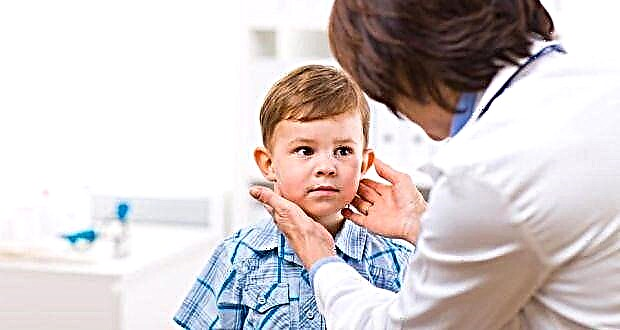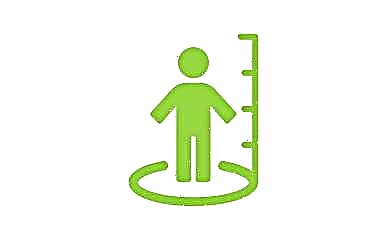Children under one year old often suffer from a variety of acute respiratory diseases and infections. This is due to the immaturity of the child's immune system. Inflammation of the larynx, or laryngitis, is especially common in babies prone to allergies. In some cases, this disease requires urgent medical attention.

Children's acute respiratory infections can develop into more dangerous diseases
What is laryngitis and laryngotracheitis
Laryngitis is an inflammation of the larynx. The disease is manifested by the following symptoms:
- redness of the throat;
- frequent dry cough that gets worse at night;
- slight increase in temperature;
- swollen lymph nodes.
If inflammation of the trachea joins, such an infection is called laryngotracheitis. With the wrong treatment, it can turn into bronchitis or pneumonia.

Laryngitis starts like any respiratory infection
Laryngotracheitis causes, risk factors
Laryngotracheitis without fever in a child is not dangerous, but at night it can cause stenosis of the larynx, or false croup. The most common causes of laryngotracheitis are viruses and allergic reactions. The risk group includes the following categories of children:
- babies up to a year on artificial feeding, not receiving breast milk;
- frequently ill children;
- infants with allergies;
- babies who have recently been in contact with patients with acute respiratory infections (for example, at an appointment at a children's clinic).
The propensity to disease does not depend on heredity.
Forms of the disease
Treatment of laryngotracheitis in infants depends on the form in which the disease proceeds. It can be acute or chronic. In the first case, it proceeds sluggishly, exacerbating in the cold season (mainly in spring and autumn). In the second case, the infection is paroxysmal and appears suddenly. This usually happens at night. Typical symptoms and signs of an acute form:
- loss of voice;
- a cough that resembles a dog barking;
- labored breathing;
- wheezing in the lungs.
The onset of the disease is always unexpected for parents, this is precisely the main danger.
Attention! The most dangerous is the acute stenosing form of the disease. In this case, laryngeal edema can cause suffocation and death.
Diagnosis of the disease
Laryngotracheitis in a child is diagnosed during the examination by a pediatrician. To make a diagnosis, the doctor examines the patient's medical history. The physician then examines the child's throat and listens for his breathing. Laryngotracheitis is characterized by the presence of so-called "dry" wheezing. Additionally, the physician may prescribe:
- general urine analysis;
- blood test;
- fluorography or x-rays to rule out the likelihood of developing pneumonia.
Important! It is strictly forbidden to diagnose yourself without waiting for a doctor's examination. Parents can only alleviate the condition of the baby, but the treatment is prescribed by the pediatrician.

The main sign of laryngitis is severe redness of the throat.
First aid
If the baby has laryngotracheitis, the doctor will tell you how to treat the baby. Self-medication can be very dangerous, as can inaction. To provide first aid you must:
- sit the little one in an upright position so that it becomes easier for him to breathe;
- give the baby an antihistamine in a dosage appropriate for age to relieve laryngeal edema;
- if the child breathes with wheezing, inhale him using any inhaler for patients with bronchial asthma;
- water the baby so that it is easier for him to cough up thick phlegm.
With a barking cough and loss of voice, an ambulance should be called immediately.

Loss of voice in a baby is an alarming signal
Attention! If it is difficult for the child to breathe, you should open the windows in the apartment and, if possible, take the baby out into the fresh air. You can also go into the bath with your baby and turn on the hot water. Steam helps to improve airway patency and expands the bronchi.
Laryngotracheitis treatment
The general approach to the treatment of the disease is approximately the same as in the treatment of other acute respiratory viral infections. The child is given antiviral drugs that increase immunity, and cough medicines that thin phlegm. Temperatures below 38 degrees are not knocked down, because this is how the body's protective reaction manifests itself when it encounters a virus.
The correct regimen for treating the disease
If laryngotracheitis in an infant proceeds without elevated body temperature, the child may not be restricted in movement. At temperatures above 38 degrees, the baby should be given an antipyretic. Also, to organize the correct regime, you must:
- ventilate the room in which the baby is located several times a day;
- temporarily do not bathe the baby until he recovers;
- give the baby to drink as much liquid as possible;
- do not allow the child to cry for a long time, so as not to increase the irritation of the throat.
Walking is not prohibited if it is warm outside and the child's temperature is below 38 degrees. In winter, you should not go outside, because the ingress of cold air into the lungs can intensify the course of the disease.

If there is no temperature, the baby does not need bed rest
What not to do
It is strongly not recommended to treat the baby with the help of various herbal remedies (herbal infusions and decoctions). Laryngotracheitis often occurs in children prone to allergies, so any herbal medicine can aggravate the disease, provoking an unwanted reaction. For the same reason, you should not lubricate your baby's chest with warming ointments that relieve coughing, and give honey inside.
Before using any folk remedies, you should consult your pediatrician. Also, do not inhale over the steam from boiled potatoes, because this can cause the child to burn the respiratory tract. Inhalation for tracheitis at home can be done only with the help of a special device - a nebulizer, in accordance with the recommendations of a pediatrician.
Doctor Komarovsky's recommendations
When asked how to treat laryngotracheitis in a child, Komarovsky replies that antibiotics are ineffective in this case, because the disease is most often caused by viruses. Komarovsky claims that the main thing with laryngotracheitis is to relieve an attack of stenosis, which is manifested by a barking cough and respiratory failure at night. After that, you can follow the same tactics that parents usually use when treating a common ARI. If you do everything right, the disease will go away in seven to ten days without complications and will not recur. However, weakened children can suffer from laryngotracheitis several times per season.
Komarovsky also argues that you should not buy expensive cough syrups to thin phlegm. It is enough just to increase the amount of liquid drunk by the child, after which the thickness of the mucus will decrease, and the baby will breathe easier. Also, with increased production of sputum, you can give the child a special massage to help the mucus go away better. With the right regimen, curing the disease is not difficult.
Disease prevention
For the prevention of the disease, it is necessary to monitor the baby's nutrition, walk with him as often as possible, and include hardening procedures in the mode. In the cold season, one should not visit crowded places with a child, since the disease is transmitted by airborne droplets when in contact with sick people. The following guidelines will also be helpful:
- always dress the baby for the weather and do not wrap him up in order to prevent increased sweating;
- when it's time to introduce complementary foods, you need to do it very carefully so as not to cause food allergies in the child;
- up to a year to completely exclude strong allergens from the diet (nuts, chocolate and citrus fruits);
- do not give your baby cold drinks and ice cream;
- do not give the crumbs too hot drinks, because the increased temperature of the liquid also irritates the throat.
These simple recommendations will help you avoid a dangerous disease. If laryngotracheitis is nevertheless confirmed, the baby will transfer it in a mild form, without dangerous stenosis of the larynx. It will be possible to be treated at home, without hospitalization.
If a child suddenly has a cough, especially at night, do not panic. The main thing is to control the baby's breathing in order to quickly take action if necessary. With a timely visit to a doctor, laryngitis is successfully treated and does not cause complications. The same can be said about laryngotracheitis.



